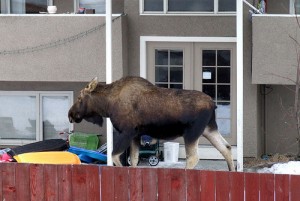Anthology Poet Highlight 33/82: Matthew James Babcock, “Moose Remembered” (scroll down)
[audio: http://www.terrain.org/poetry/25/mp3/Babcock_MooseRemembered_Terrain.org.mp3]
(Matthew’s reading of “Moose Remembered” [from Terrain.org])
This poem features a moose, but it’s about memory: the redemption of past experience. “This was when,” the poet begins, speaking to his wife, I presume, about a Saturday morning earlier in their marriage when he, as a young husband and father trying to make good on those titles, had swaddled their “baby girl” as Mom slept and “carried [the infant] out on the driveway to watch a yearling / moose that had wandered into town from the Teton Basin.” He repeats the full opening phrase—”this was when”—twice more in the poem and with its fourth appearance he modifies it slightly, replacing the “when” with “everything.” In the first three instances, the phrase brushes against the past progressive, suggesting that the strange confluence of events narrated by the poet was happening when “this” poem, “this” memory, “this” attempt to make himself at one with his personal expectations, with his family and his community, and with nature were conceived.
In fact, I could argue that the particular experience narrated in the poem didn’t exist until the poet clothed it in breath (something foregrounded by the super-long lines) and language. In that light, this memory wasn’t until the poet said “this was.” And the experience gets reshaped—and thus re-deemed as an important moment (else why record it?)—each time the poem is repeated. Language, then, becomes the catalyzing event during which consciousness and lived experience form and reform memories. In other words, human memory seems to grow out of our awareness that we’ve experienced something worth remembering; and the moment we try to put that something to words is the moment we begin the process of trying to redeem it from the entropy of forgetting.
There also seems to be another attempt at redemption taking place in “Moose Remembered,” this one suggested in the fourth appearance of “This was.” “This was everything you missed,” the poet says, speaking again to his wife in what this time reads as an act of confession. A confession of regret, perhaps, for the delinquencies and other indiscretions that surrounded the family’s life-as-remembered in the poem: the rowdy neighbors kept under the watchful eye of law enforcement; the moose running through the neighborhood “like a big awkward kid,” a rabble-rousing teenager chased out of town by the same cop who frequented the neighbors’ domestic disturbances; the poet’s panicked “thinking” that he’d “killed [their] child with / good intentions,” even if this involuntary man-slaughter happened only in his head; the poet being able to give so “little” to his wife and their baby girl and his subsequent over-compensation for being so supposedly absent as a husband and father.
Once he confesses these “transgressions,” he seems to find some degree of reconciliation with this confluence of experiences and the people who played roles therein. The morning’s “monumental ruckus” dies down. The moose and the cop cruiser slip down the “alley” beside the movie theater, maybe to play different roles in other memories, to manifest as different desires, different mental policing strategies. Together, the disruptive family next door steps from their house to join the poet and his daughter in the near-“sanctuary” of the driveway, where they all enjoy the “quiet” of communion. And after expending his breath in the long, breath-unit lines of what I’m calling his confession, in the poem’s final half-line the poet can rest his lungs, his tongue, and his “witness” of the past because he’s fessed up (as it were) to his wife and to himself about the morning’s events. And apparently these reconciliations—the ones the poem seems to build up to from the beginning—have, by every indication, been “a long time” coming.

